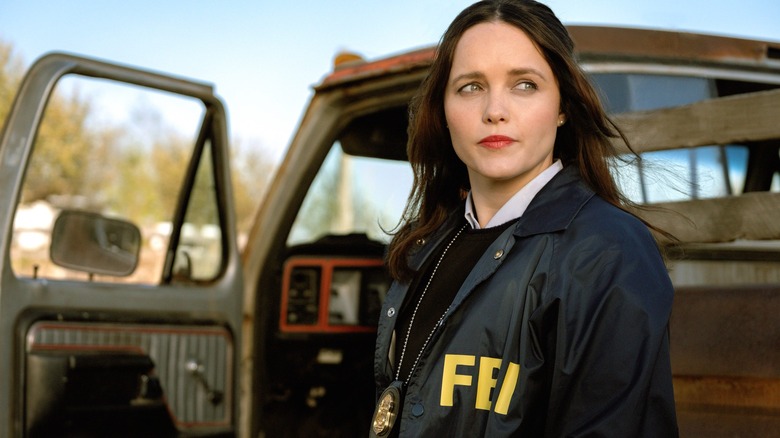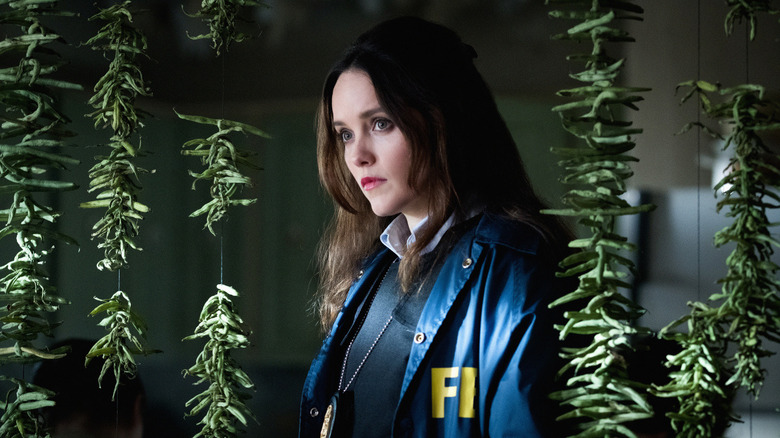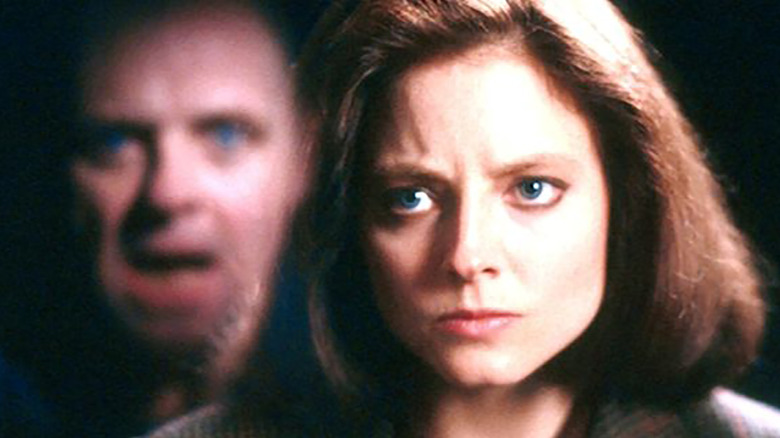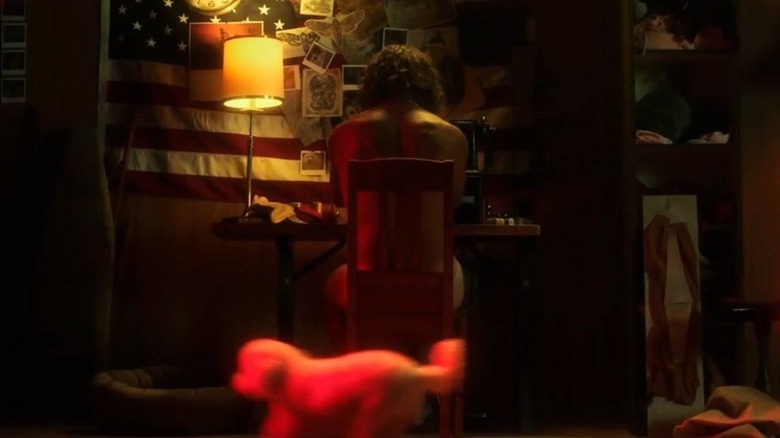Why Was Clarice Canceled? Here's What We Know
In one of the more peculiar endings to a highly-publicized series, the cancelation of CBS' "Clarice" has left many confused on just what the hell happened. Originally scheduled to pivot from CBS to Paramount+ following the first season, a report from Deadline states that negotiations between ViacomCBS and co-producer MGM reached a stalemate, leaving little indication "Clarice" is set to return anytime soon, if ever.
With negotiations at a standstill, there was no longer a path for "Clarice" to continue on CBS as the network's slate of series for next season was already full, so without the option of Paramount+, "Clarice" is without a home, and more importantly, without a production company to keep the series running.
For a show based on such a well-known intellectual property, "Clarice" seemed like a recipe for instant success. So what happened?
Ratings for Clarice Were Less Than Stellar
Most obviously, the audience numbers for "Clarice" simply weren't there. Upon release, "Clarice" was the least-watched and lowest-rated scripted series on CBS. The show fared better on Paramount+ streaming, inspiring the possible pivot, but the lack of viewership was a huge blow for CBS, especially considering the network finished the 2020–2021 television season as the nation's most-watched television network for the 13th consecutive time. Their flagship show, "NCIS," is still the most-watched show on network television, proving there's always money in good ol' crime shows. A lack of viewership for "Clarice" wasn't due to a lack of viewership for CBS or law enforcement dramas; this was an issue of people specifically not watching "Clarice."
If you ask me, "Clarice" was set up for failure from the moment it was greenlit.
Clarice Couldn't Capture the Hannibal Fanbase
The series was promoted as a follow-up to the Academy Award-winning film "The Silence of the Lambs," centering on special agent Clarice Starling's career following the death of Jame Gumb aka Buffalo Bill. The film solidified Jodie Foster as an undeniable star and made a horror icon out of the character of Hannibal Lecter. "Clarice," however, was legally unable to make any reference to Dr. Lecter due to a ridiculously convoluted rights issue where the characters in Thomas Harris' books are split up between MGM and the Dino De Laurentiis company.
To put it simply, if a character existed in NBC's "Hannibal" series, "Clarice" was not allowed to reference them.
This meant that the rabid fanbase of Bryan Fuller's "Hannibal" series had no initiative to tune in to "Clarice." When the series centering on everyone's favorite charming cannibal came to an end, audiences were furious. Multiple petitions to save the show popped up overnight, and even the announcement of "Clarice" was plagued with furious Fannibals questioning the necessity of the series when hordes of fans were begging for a new season of "Hannibal" instead. What should have been an easy crossover market instead became a hotbed of hostile fans feeling scorned and directing their anger toward "Clarice."
But it doesn't end there.
Clarice Starling's Legacy is Complicated
For years, the character of Clarice Starling (namely, Jodie Foster's portrayal of her) has been held up as a boundary-breaking and glass ceiling-shattering feminist icon. Hell, the American Film Institute considers her to be the greatest heroine in film history. Clarice Starling overcame systemic misogyny, broke into the boy's club of the FBI, managed to obtain information from Dr. Lecter that no one else could, and single-handedly solved the case of Buffalo Bill while her superior and his all-male crew were investigating the wrong house. On paper, Clarice sounds like an inspiration to women all over the world.
Until you remember that, at the end of the day, she's still a cop, and "Clarice" debuted at the same time Americans were chanting "defund the police" in the streets. Regardless of your personal feelings about law enforcement officers, the fact that a show was coming out glorifying the actions of a white rookie FBI agent during one of the most prominent calls for law enforcement accountability in history was a recipe for disaster.
The series was in constant conflict with its own morality as a police procedural set in the 1990s viewed through the lens of 2021 accountability. The FBI in "Clarice" is correctly presented as not without flaw, but also continuing to push the narrative that the FBI is a saving grace. The show tries its best to critique the power structures in place that keep people like Clarice Starling out, while simultaneously wanting us to cheer for her when she succeeds within the confines of said power structure, rather than dismantling it. She's a brilliant agent, but also one that breaks the law, entering homes without warrants, and is seldom held accountable because she manages to "get the job done."
It's impossible to hold Clarice Starling up as someone we should aspire for young women to be more like without acknowledging that, as a federal agent, she's actively participating in a field responsible for continued systemic oppression ... and that includes the capturing of Jame Gumb, aka Buffalo Bill.
Why Can't We Just Leave Jame Gumb Alone?
Despite the accolades and legacy of "The Silence of the Lambs," it'd be inexcusable not to mention the most powerful legacy of the film is its horrific treatment of trans identity. As a 31-year-old, I've never lived in a world where Buffalo Bill was not a known staple of pop culture. The same goes for my transgender wife, Harmony, who has written more eloquently than I ever could about the lasting impact of Buffalo Bill on the transgender community.
Without the possible name recognition of Hannibal, this left "Clarice" only with the option to discuss the outcome of Buffalo Bill, complete with weird flashbacks and the reopening of a wound that, for so many people, will never fully heal. The show does deserve credit for bringing on actress Jen Richards to play a trans character named Julia in an attempt to try and repair some of the harm caused by the portrayal of Buffalo Bill and the erasure of Jame Gumb's transgender identity, but the damage done is so severe it's impossible to mend.
Drew Gregory over at Autostraddle expertly described the issue of this reimagining:
The problem with this framing is it creates a dichotomy between Julia and Bill. On the one hand, you have Julia — a beautiful woman with a stable job living a stealth life. On the other, you have Bill — a pathetic man with a deep voice and stringy hair who merely dreams of womanhood. Our acceptance as women — rather than serial killer of women — becomes conditional on how well we're able to conform to a traditional idea of gender. The attempt is noble, but this revision doesn't work because once again it ignores the deeper truth — the original movie was right. Trans women and law enforcement are enemies. All it got wrong was the villain.
The decisions surrounding Buffalo Bill's presentation in "Clarice" were clearly presented with good faith in mind, but the impact did not match their heartfelt intent. Without the ability to mention Hannibal, "Clarice" was forced to exhume the corpse of Buffalo Bill during a time where the rights of trans people are being attacked at a historically horrific pace and in so doing, re-ignited the flame that has burned the trans community for almost thirty years.
It's always a shame when a show is canceled because it means the end of work for an entire crew of people and frequently leaves behind an unfinished story. This ending must have been heartbreaking for all involved, especially for Australian actress Rebecca Breeds for whom the titular character was set to be her breakthrough role in America. Unfortunately, "Clarice" is a show that never should have happened in the first place.
Sometimes it's best to let some lambs just stay silent.




